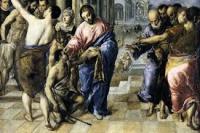
Synagogues began to be established in the first century AD. They were local centres, used for civic gatherings, as well as for study and worship. Jesus went there on the Sabbath, like other Jews, and got up to speak as he was entitled to do. . Mark describes him as teaching with authority. The Greek word “exousia” comes from the verb "exesti" which means “it is permitted.” The authority Jesus had was free from hindrance. His power was not earthly like that of a ruler or priest but emanated directly from God. The teachers of the time, the Scribes and the Pharisees, taught from the traditions they had learnt. Here was something new, which made sense to his listeners.
We are told also that he made an impression on those he spoke to. The fishermen and Matthew followed him instantly. People flocked to hear him and believed that he could heal them. Even the cynical Pilate, who historically had a reputation for cruelty, knew there was something special about him. What is more, his actions matched his words.
Perhaps one of the most dramatic things he did was to cast out demons. Possibly the term was used for various illnesses, which were not understood at that time. Evil had no power over Jesus. He always sought out the good in people rather than homing in on their failings. In the film ”The boy in the striped pyjamas”, the son of the commandant of a concentration camp meets a Jewish boy who is imprisoned there. Bruno with his innocence and questioning mind remains uncontaminated by the propoganda spread by his relatives. He sees the boy, Shmuel, as he is and befriends him. It is easy to allow our own demons to be projected on other people and then to vilify them. We need to name our own evil spirits and let Jesus help us to confront them.